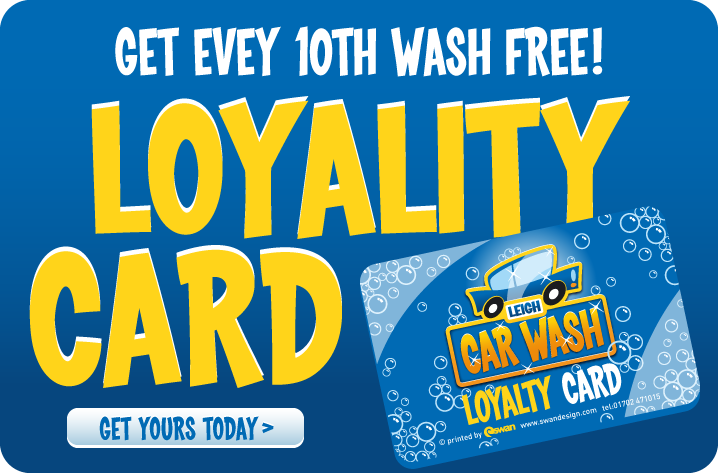Customer Loyalty Programs and the Church

On the second set, customers had to earn ten car washes for the freebie, but the first two boxes were already stamped, thereby giving them a head start.
Now if you’re awesome at the maths, you know that in both cases, they’re buying eight washes to get a free one. And if you’re awesome at common sense, you’d think there would be no difference in response.
But you’d be wrong. The people with the “head start” cards had nearly double the rate of loyalty as those who were eking out an entire punch card on their own.
So what hath customer loyalty programs to do with Jerusalem?* Obviously there are stark differences: we’re not getting people to buy into a product or an organization, but into a mission. And it’s not about what people can purchase from the church, but the gospel that the church has been called to freely distribute. However, I believe that there’s a connection between loyalty programs and guest services within the church:
People are more likely to “stick” if they feel like an insider.
I understand that plenty of churches want people to remain anonymous as long as they want to remain anonymous. I have friends who oversee guest services in those churches, and I completely get their reasoning. And while we can’t force anyone to identify themselves, we do everything possible every weekend to make self-identification not only easy, but a natural first step.
And when they do, we want to make that first time guest feel like a family member as quickly as we can. It’s a delicate process: too much information feels like we’re desperate, clingy, and assuming way too much (kind of like picking out china patterns on the first date). Too little information leaves guests confused, wondering what they should do next, and often not even knowing the right questions to ask.
But there are a few simple things we try to do to make outsiders insiders, and thereby make them stick:
- Clear access points. From the first moment a guest drives onto a campus, we want them to know we’ve prepared for their visit. We do that through signage, greeters, and an obnoxiously in-the-way first time guest tent that just dares them to bypass it. Guests can choose to self-identify, and when they do, we help take the edge off of an anxious first visit.
- Targeted conversations. While there’s a certain “one size fits all” approach to dealing with guests, we all know that one size definitely doesn’t fit all. That’s why the goal is always to figure out how we can specifically connect with a specific guest’s specific needs, and respond appropriately.
- Tailored event. We offer a newcomer’s event once a month at every campus called Starting Point. More than anything else we do, Starting Point makes the Summit feel like home over the course of a couple of hours. I’ve known people who have attended here for years, yet they said that it wasn’t until they (finally) showed up at Starting Point that they had one of those infamous “AHA!” moments and felt like they’d infiltrated the bubble. That’s why our goal is to get every first timer at Starting Point within one to three months of their first visit.
The point of all of these things isn’t to build the attendance metrics of the Summit. It’s not to bump our membership stats. The goal is to create an environment where people who are on the outside can relatively quickly move to the inside. Because when that happens, it’s fertile breeding ground for the gospel to go forward and truly impact their lives.
*It’s a takeoff on a quote by Tertullian, and when I say junk like that I feel 24% smarter.

I’ve begun really thinking about simple next steps to integration (your #3). From your vantage point, what are some common ones?
I’ve seen
* Wednesday night suppers
* Post service mini-receptions
* Newcomer gatherings every 4-6 weeks
I’m always looking for additional ideas to help suggest for churches looking for ways to form new friendships
Chris, we’ve tried all sorts of formulas over the last decade. Everything from right-after-service 20 minute intro events, to three week classes, to…you name it. All have their strengths and weaknesses, but I’d say the bottom line comes from what you’re specifically trying to accomplish. Because we’ve solidified our purpose of Starting Point, we have also solidified the method of delivery. Ours happens once a month, on a Saturday night or Sunday (depending on the campus and the mobile site building schedule), and lasts for approximately 2.5 hours (1.5 hours of teaching plus (hopefully) a meal on the front end and a Q&A time on the back end). It’s become a highly polished, highly structured time, involving a specialized team of volunteers, event-specific childcare, custom curriculum, a meal, etc.
But then again, that model assumes we’re going to have some very specific next steps coming out of it (baptism, membership, small groups, ministry opportunity). If a church is looking for more of a social, low-impact, getting-to-know-you event, I’d say any of those things above are helpful.
I’ve also seen some pastors host “Dinners for Ten” at their home once a month, and those can be incredibly effective. Larry Osborne (North Coast Church, CA) has done this for some time now (or at least, he was still doing it as of a couple of years ago), and it makes a very, very large church feel very small.